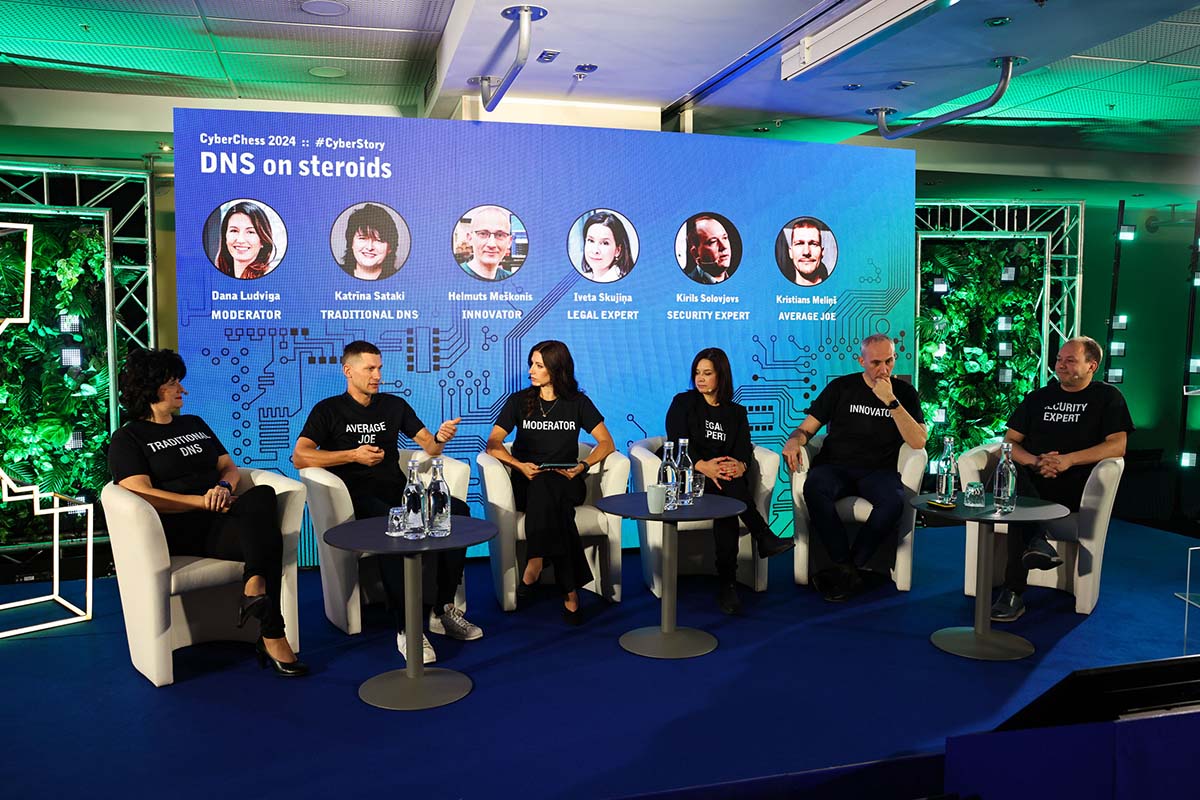- Cookies that enable provisioning of services you require.
- Cookies that inform NIC.LV about your visit on the website www.nic.lv - your consent is necessary for use of these cookies.

From October 1 to 3, one of the leading cybersecurity conferences in the Baltics, CyberChess 2024, took place in Riga. The event brought together over 50 speakers from nearly 20 countries. Held at the Radisson BLU Latvija Conference Center and online, the conference covered a wide range of cybersecurity topics.
One of the key highlights was the October 3 panel discussion, “DNS on Steroids,” where experts discussed the development of the Domain Name System (DNS) and future challenges.
During the discussion, the moderator Dana Ludviga (CERT.LV) and the panelists Katrīna Sataki (NIC.LV), Helmuts Meškonis (Domain Summit Ltd), Iveta Skujiņa (NIC.LV), Kirils Solovjovs (Possible Security) and Kristians Meliņš (NIC.LV) explored the significance of DNS in the internet’s infrastructure. DNS, often referred to as the backbone of the internet, has evolved significantly over time, but also faces new challenges and security risks.
One of the discussion points was the growth of gTLD (generic Top-Level Domains) and IDNs (Internationalized Domain Names, which now in total are 362 million domain names and soon will be more. The panel emphasized the need for DNS security improvements, as the system’s architecture is vulnerable to various flaws, such as implementation errors and human oversight.
Several critical security issues were discussed, including DNS spoofing and DNS tunneling, which allow malicious actors to exploit DNS infrastructure for data exfiltration. Experts highlighted the importance of implementing DNSSEC (Domain Name System Security Extensions) to protect against such threats. Multi-factor authentication and regular security audits were also noted as essential security measures to mitigate vulnerabilities.
The discussion also covered the potential impact of emerging technologies, such as Web3 domains, on DNS and internet users. While Web3 and decentralized addressing technologies offer new opportunities, they also pose significant legal and regulatory challenges. For example, decentralized DNS roots and Web3 domains could create complications with existing regulations, such as GDPR (General Data Protection Regulation) and the NIS2 (Network and Information Security Directive) directive, which require careful management and security measures.
A central theme of the discussion was the balance between security and user convenience. DNS security measures, such as DNSSEC and multi-factor authentication, can help protect against attacks but may also complicate the user experience. The panelists emphasized the importance of developing solutions that are both secure and user-friendly, particularly in areas such as the introduction of new gTLDs and DNS management in decentralized environments.
The CyberChess 2024 “DNS on Steroids” panel discussion shed light on many critical issues related to DNS security and emerging technologies.
Key takeaways included the need for continuous security enhancements and clear governance frameworks to avoid cyber threats.
As the backbone of the internet, DNS will continue to evolve, requiring both technological and regulatory solutions to ensure stability and security for all users.
Programme and video recordings: https://cyberchess.lv/